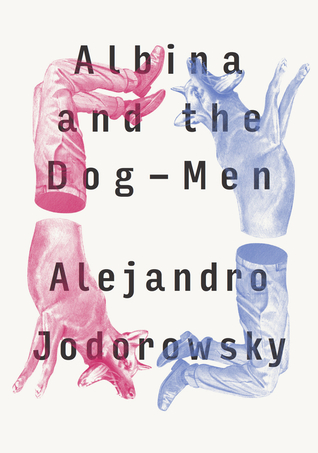A modern-day Kafka story on hallucinogens, with strong doses of mysticism and horror, Albina and the Dog Men reads like an ancient folk tale whispered at night, fused with an urgent critique of contemporary society. Its essence is dark magical realism that throws into question the nature of what it is to be human.
Goodreads description
Over on the Magic Realism Books Facebook Group a discussion has started about the role of surrealism in magic realism and whether the two are distinct. This book highlights that the boundaries between the two are blurred.
Jodorowsky is best known for his work as a film director, but he is talented in many fields - Wikipedia describes him as a film and theatre director, screenwriter, playwright, actor, author, poet, producer, composer, musician, comic book writer and spiritual guru.
It is worth examining Alejandro Jodorowsky's magic-realist and surrealist heritage. Jodorowsky was born in Chile in 1929 to Jewish Ukranian parents. As we have seen in other books reviewed on this blog, there are strong magic-realist South American, Jewish and Eastern European traditions and Jodorowsky was heir to all three. From 1950 he divided his time between France and Mexico. In Mexico he became friends with the British surrealist artist Leonora Carrington, whose book The Hearing Trumpet I reviewed in the early days of this blog. When I first read Albina and the Dog Men and before I researched the book's author, I was very much reminded of Carrington's work of magic realism.
The other book I was reminded of was Jeanette Winterson's Sexing the Cherry, whose monstrous and remarkable central character not only is called the Dog Woman but has the same elemental strength as Jodorowsky's two central female characters. But while I consider both Carrington's and Winterson's novels to be magic realism, I do not find Albina and the Dog Men to be so. For me there is not enough realism in this book to be magic realism. No this sexy, raucous, mystical and amazing book is just too surreal.
I received this book free from the publisher in return for a fair review.
The other book I was reminded of was Jeanette Winterson's Sexing the Cherry, whose monstrous and remarkable central character not only is called the Dog Woman but has the same elemental strength as Jodorowsky's two central female characters. But while I consider both Carrington's and Winterson's novels to be magic realism, I do not find Albina and the Dog Men to be so. For me there is not enough realism in this book to be magic realism. No this sexy, raucous, mystical and amazing book is just too surreal.
I received this book free from the publisher in return for a fair review.

No comments:
Post a Comment